|
|
|
Sort Order |
|
|
|
Items / Page
|
|
|
|
|
|
|
| Srl | Item |
| 1 |
ID:
049541
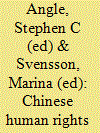

|
|
|
|
|
| Publication |
Armonk, M.E. Sharpe, 2001.
|
| Description |
xliv, 476p.
|
| Standard Number |
0765606925
|
|
|
|
|
|
|
|
|
|
|
|
Copies: C:1/I:0,R:0,Q:0
Circulation
| Accession# | Call# | Current Location | Status | Policy | Location |
| 046205 | 323.0951/ANG 046205 | Main | On Shelf | General | |
|
|
|
|
| 2 |
ID:
178315
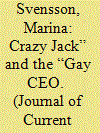

|
|
|
|
|
| Summary/Abstract |
This article analyses the visions, careers, and companies of Jack Ma of Alibaba and Geng Le of Blue City. Jack Ma is a well-known business leader and visionary, whereas the less well-known Geng Le only began to receive more attention since launching a successful gay dating app in 2012. The article focuses on the personal narratives and visions of these two IT entrepreneurs. It provides new perspectives on the role of individual entrepreneurs in relation to the Chinese state’s global ambitions and vision of creating a “strong internet country.” It argues that the commercialisation and platformisation of the Chinese internet, and the growing transnational nature of Chinese IT companies, serve to make them more, not less, co-dependent of the state and its visions. The internet’s emancipatory potential is today increasingly conflated with consumption, and online spaces and social relations are subject to both commodification and datafication.
|
|
|
|
|
|
|
|
|
|
|
|
|
|
|
|
| 3 |
ID:
118675
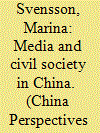

|
|
|
|
|
| Publication |
2012.
|
| Summary/Abstract |
Although Chinese journalists are not able to create their own independent organisations, they are engaging in informal networking on-line and off-line that has created a strong sense of community among investigative journalists in particular. Through sharing experiences, stories, and struggles, journalists create a collective identity and define their roles in society. Earlier studies of Chinese journalists haven't explicitly addressed the issue of how a journalistic community is created and sustained in a society that lacks freedom of the press and where freedom of association is severely restricted, and the importance of new information and communication technologies (ICTs) in this context, which is the focus of this article. Furthermore, it is important to study the extent to which and how investigative journalists network with other groups in society, including lawyers, public intellectuals, and civil society organisations. With the development of micro-blogging (weibo) we see new forms of community building, more open expressions of solidarity and ironic resistance, as well as increasing levels of interactivity between different groups in society. By reporting on injustices and the situation of marginalized groups in society, and commenting on public events on weibo, investigative journalists interact with many different groups in society and become part of a larger community of people who share the same ideals and struggles. Some journalists go one step further and set up or become actively involved in charity work and civil society organisations.
|
|
|
|
|
|
|
|
|
|
|
|
|
|
|
|
| 4 |
ID:
178311
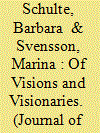

|
|
|
|
|
| Summary/Abstract |
This special issue approaches information and communication technologies (ICT) visions and their realisation/implementation at various levels, among different actors and from various perspectives. Conceptually, we distinguish three different dimensions, even though those overlap in the individual contributions as well as in empirical reality – namely ideational, instrumental, and relational. The different contributions address both visions formulated by the Chinese state and by individual actors such as entrepreneurs. Even though the conditions for the use of ICT in China are deeply affected by state governance, this governance is in no way tantamount to one single government. As this issue’s contributions show, state attempts at building a stable cyber-governance are in need of allies and, depending on the allies’ visions and other, competitive visions, the outcomes of these dynamics are seldom truthful realisations of one original grand masterplan.
|
|
|
|
|
|
|
|
|
|
|
|
|
|
|
|
| 5 |
ID:
133729
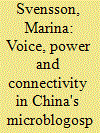

|
|
|
|
|
| Publication |
2014.
|
| Summary/Abstract |
This article addresses the issue of who has a voice on microblogs in China and what having a voice in the age of social media actually means. In theory, microblogs have a low threshold and are easy to use, thus enabling more Chinese citizens to articulate their concerns as well as paving the way for interactivity among different groups of people. In reality, however, not all citizens are as likely to use microblogs or be heard through them. Although microblogging practices have spread from the technology-savvy early adopters to broader groups in society, one should not assume that microblogs have helped bridge the information gap among China's ICT users, or empowered everybody in equal measure. This article discusses the demographics of microblog users, addressing diffusion patterns, number and range of followers, as well as topics discussed and how these are shaped by microbloggers of different socio-economic status. It makes use of and synthesizes existing surveys and previous studies in the field, while also building on this author's qualitative and ethnographic research on journalists and migrant workers. The article also addresses the 2013 crackdown on opinion leaders on microblogs and its implications for public debates and connectivity on social media.
|
|
|
|
|
|
|
|
|
|
|
|
|
|
|
|
|
|
|
|
|